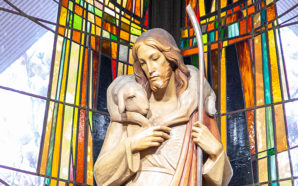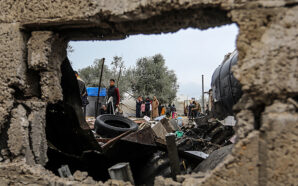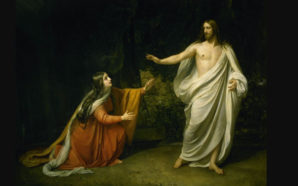The felt need for a canopy of meaning and of reassurance that can be trusted.
Palm Sunday alternates between March and April. When, as this year, it is celebrated in April it keeps company with a number of days that provoke us to ask what and who matter, what and whom can you trust.
If it is a cruel month, it is so because it tests, even mocks, our comfortable assumptions. In a year overshadowed by manifestations of climate change, of persistence of Covid and of the horrors of war, it is not a bad month to endure an election.
April begins with April Fools Day, when the wise person lays aside all the opinions about predictability and reliability that counted for wisdom and becomes a sceptic for the day. It is designed to trap those who believe that their own world and place in it are solid and unshakeable.
The Christian feasts during April cut deeper, entering at two levels into the lethal world of power and security.
At one level they describe what God is doing; at another level they describe what human beings are doing. The Son of God enters Jerusalem, the heart of the people whom he has chosen, in order to win and to heal them.
Jesus, an undefended human being, enters the city only to be rejected and ejected both from city and life. The week from Palm Sunday to Good Friday is a reflection on God’s hospitality and human inhospitality. On Easter Sunday God’s hospitality wins at a heavy cost.
On Palm Sunday Jesus enters Jerusalem with the trappings of royal power – not walking but riding, and attended by people waving branches and singing. The trappings, however, were a mockery and critique of the way power is exercised in human affairs.
Jesus had only a few followers. They were unarmed. And he came, not on a horse but on an ass, a domestic animal on which any rider looks ridiculous. It was a comic scene.
He came to the seat of power as a simple human being, relying on the truth of his words and on God whom he represented.
The authorities perceived both his lack of power and his insolence and had him killed on Good Friday in a way designed systematically to erase all traces of his humanity.
Yet in the event Jesus’ rising from death showed God’s way of accepting humiliation to be powerful and life giving in contrast to the futility and falseness of the way of power.
That double path of scorn for the logic of power and of submission to it marks Christian faith and the stories of the Gospel.
Jesus’ critique of Herod’s rule in Luke’s parable of the talents is perceptive and critical.
His treatment of tax enjoins submission to taxation, but his instruction to his disciples to find the temple tax in the mouth of a fish displays a lack of seriousness about it.
When apprehended, Jesus restores the servant’s ear cut off by Peter. He accepts arrest.
But he exposes the corrupt nature of the trial and decides for himself which questions he will answer. He is not an anarchist but nor is he intimidated by power and institutions. What matters and who to trust are questions to be answered at a higher level.
Each human being is worth living and dying for
St Paul develops this double path in describing God’s path as one that identifies with human suffering of injustice by accepting it and so freeing humanity from its chains.
It shows that human beings matter and that God is to be trusted. He endorses an acceptance of and submission to power and its economic and judicial institutions, and at the same time a cold-eyed refusal to accept their ultimate importance and the authenticity of the values they endorse.
The story of Palm Sunday speaks to the experience of refugees.
That is why throughout Australia it is associated with marches and demonstrations for refugees. Like Jesus in his entry into Jerusalem, unarmed refugees also seek hospitality in centres of power and wealth.
Like him, too, they are perceived as a threat, are driven off, imprisoned, maligned and left resourceless. They make us ask what a human being is worth when stripped of power, connections and human identity and who is to be trusted when responding to them.
Palm Sunday and the vindication of Jesus at Easter answer that question.
Each human being is worth living and dying for. God has done so, has exposed the weakness and narrowness of governments that exclude and punish refugees, and has encouraged us to find life in hospitality to those whose life is diminished.
This year we have in our minds and hearts people who have been forced to leave Ukraine. We remember, too, the people in Afghanistan whom we have promised to help, and all the people who have had to flee from their own nations.
Palm Sunday is a day to be compassionate and to be in solidarity with them as they call on us for food, shelter and opportunity to live with dignity.
This year, too, is a day for us Australians to welcome the refugees who have settled in Australia. It is also a day to remember the suffering of refugees in Australia who have been kept for many years in detention and those who are forced to live from hand to mouth on temporary visas.
Palm Sunday is about an extravagant hospitality that trumps all human inhospitality.
Visas are about enabling life and new beginnings. They matter because people matter. And because they matter, so do the response of politicians to them during the coming election campaign.
On 25 April is celebrated Anzac Day. A military disaster in which many young Australians died, families lost husbands and sons, and others were left to live with physical and psychic scars, it continues to make us ask who and what matters, who and what is to be trusted.
Initially it rightly reassured the colleagues and relatives of those who died in war that they still mattered, and also reminded them that power is not to be trusted, particularly in the business of killing.
It has also at times been coopted by power to say that wars matter because the forge national identity and that politicians are to be trusted when endorsing and glorifying them. In this cruel April such claims seem threadbare.
All these events of April have in common the felt need for a canopy of meaning and of reassurance that can be trusted, and the recurrent temptation of rulers and their apologists to construct that canopy out of demonstrations of power.
The merit of the Christian story is to undercut the claims of power and to find assurance in God’s chosen weakness.
Andrew Hamilton is consulting editor of Eureka Street, and writer at Jesuit Social Services.
With thanks to Andrew Hamilton and La Croix International, where this article appeared.








